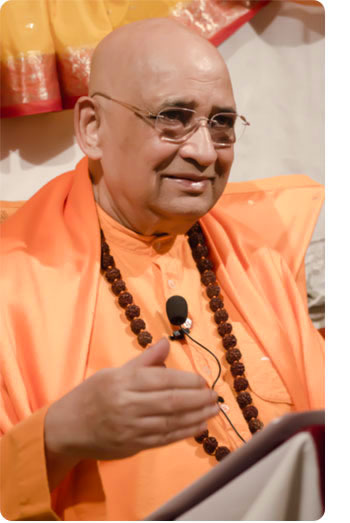 |
Vedanta Philosophy Drawing from the ancient truths of the Vedantic Scriptures, and expressed with rare intuition, Swamiji helps the individual to gain an insight into the mystery of life, means to unlock one’s infinite potential, and work on the time-tested techniques of Integral Yoga towards one’s spiritual evolution. Through a carefully laid-out plan of personality integration, one is guided through a step-by-step process to cultivate the four aspects of one’s personality—Action, Emotion, Will and Reason, through the four major Yogas—Karma, Bhakti, Raja and Jnana. With careful study and persistent effort, one learns to convert one’s daily actions into a most powerful spiritual practice culminating in Self-Realization. |
Yoga Vasistha
Yoga Vasistha was written by Sage Valmiki in the form of a dialogue between himself and his pupil, the young Prince Rama. It constitutes the basis of Advaita—or non-dualistic Vedanta.
This ancient scripture expounds on a wide variety of topics such as—Mysteries of the Soul, Death and Reincarnation, the Subtle Operations of the Unconscious Mind, and the techniques of spiritual enquiry and meditation.
Tulsi Ramayana
This colorful Epic was originally written by Sage Valmiki in Sanskrit. It was embellished and re-written by Sage Tulsidas in the popular language of the people viz Hindi.
The Ramayana presents lofty ideals covering all relationships in life, which serve as an example for all to emulate, towards a highly cultured society. It encompasses the essence of Vedanta and when understood and reflected upon, becomes a powerful promoter of spiritual transformation, leading the way to Self Realization.
The fascinating and highly imaginative stories about Rama, take on a whole new dimension by the profound mystical interpretations in the discourses of Sri Swami Jyotirmayananda.
The Upanishads
The Upanishads present the culminating wisdom of the Vedas, and are therefore widely known as “Vedanta.” Their wisdom rings with the message: “Brahman, (Absolute Self) is the only Reality; every soul is essentially Brahman, and that this world, experienced through the mind and senses, is Maya or illusory – like a mirage.”
The message of the Upanishads is timeless in its essence for the spiritual evolution of mankind.
Srimad Bhagavad Gita
Encompassed within the great Epic of the Mahabharata, which was composed by Sage Vyasa many centuries before Christ, the Gita is presented as a dialogue between Lord Krishna and His beloved disciple Arjuna.
It is one of the most succinct and profound philosophical and spiritual treatises on Vedanta philosophy. Universal in its exposition of man’s movement towards the fundamental understanding of one’s purpose in life, the Gita is a powerful means of attaining Self-Realization.
